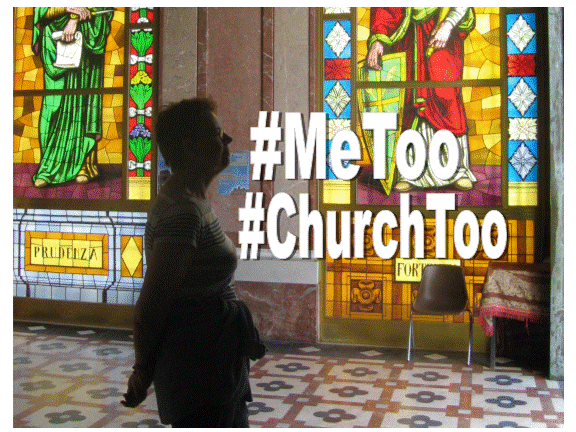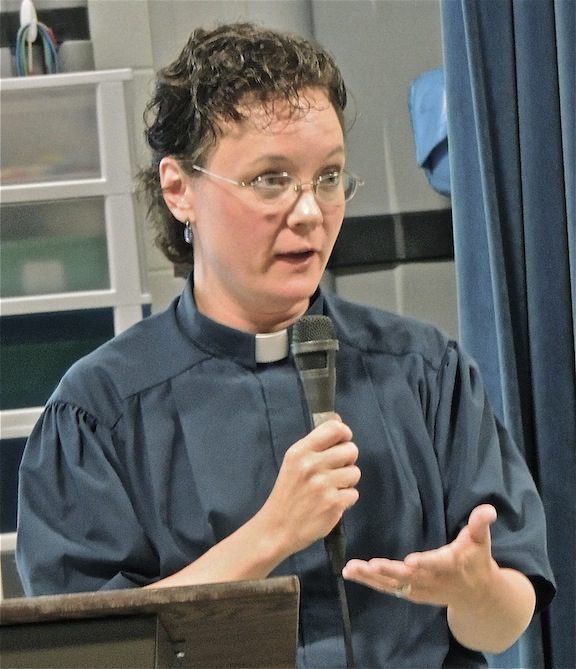#MeToo, #ChurchToo: The #MeToo movement is beginning to well up within the Christian Church. We’re starting to realize that sexism is rampant in #ChurchToo. #HerTruth

Women in congregations are peering out from stained glass windows watching the secular world finally confront sexism, discrimination, and abuse.
And we’re wondering – what about us?
What about the institution in which we have committed our faith, our hearts, minds, and bodies? Only to have those bodies objectified. Our minds stymied by the church’s entrenched and unrelenting patriarchy. Hearts broken by people we trusted who have betrayed us with their sexist words and actions. Faith shackled by a system that refuses to hear, believe, or respond to reports of sexual misconduct.
The almost-daily revelations of sexual discrimination and abuse allegations against men in Hollywood, newsrooms, and government (including President Donald Trump himself) has prompted a social media campaign by women across the political spectrum. Thousands of women are sharing personal stories of experiencing sexual harassment under the hashtag or title “MeToo.” This movement is revealing how pervasive sexism is in our society.
Now women in congregations are beginning to ask – when will the truth come out about sexual misconduct in the church?
A Lutheran clergy friend of mine, Christine Merkel, is inviting women (and men) in the church to share their stories of how they have experienced or witnessed instances of sexual harassment, misconduct or abuse from men in power. In a Facebook post she writes: “My personal story and the stories I’ve heard from so many other women is of the church’s failure to take accountability for sexism, sexual harassment/assault, domestic violence, etc., that has taken place far, far, more than anyone can imagine.” [Read: The Church’s Casting Couch. Reach Christine at: https://www.facebook.com/cats333].
Patheos “Irreverin” blogger, Erin Wathen, a Disciples of Christ-Christian Church pastor, is also offering a public forum for women in the church to safely share the truth about the discrimination and harm they have suffered as a result of men in power. [Contact Erin at: https://www.facebook.com/irreverin/.] Whether those men are senior pastors, associate ministers, youth ministers, Sunday School teachers, council presidents, bishop assistants or bishops themselves – it’s time to tell the truth and stop keeping secrets. [See the 18-minute video, #HerTruth.] As Erin writes:
It is especially important right now that the Church (read: universal Church) recognize its own culpability in upholding the culture of misogyny, and then commit to being part of the solution . . . We can watch the fire in terror, wondering what part of our safe and familiar lives will catch next… or we can fan the flames. We can remember those are flames of justice, flames of truth-telling, flames of #metoo and ‘no more.’
The Protestant Church recently celebrated the 500th anniversary of the Reformation, so this a good time to ask what needs reforming in Christianity today.
One area desperately in need of reforming is the church’s attitude toward women.
As Martin Luther boldly nailed his 95 Theses (indictments against the church’s abuse of power) to the church door in Wittenberg, it’s time for women in the church to grab the proverbial hammer and nail. We need to be up front with the truth about the way in which the church abuses, mistreats, maligns, ignores, disregards, undercuts, undermines, and damages women who answer the call to ministry.
A must-have manual for this process of truth-telling
To aid us in this truth-telling, Luther Seminary professor Karoline Lewis has written a book that is a must-read for women in the church. It’s called She: Five Keys to Unlock the Power of Women in Ministry (Abingdon, 2016). In this book, Lewis forthrightly and effectively addresses nearly every issue faced by women who inhabit any kind of church leadership position. From ordained ministers to music directors, Sunday School teachers to denominational heads – I believe all women in ministry will find this book to be helpful for navigating leadership in the church.

Coming out of her experience teaching a course entitled Women in Ministry, Lewis frankly discusses everything from how to handle sexist comments from parishioners to the perennial question: “To robe or not to robe?” Women in ministry face the ongoing dilemma of how to feel comfortable in their own bodies when every aspect of their clothing, curves, voice, hair, make-up, and even shoes are subjected to scrutiny. We must constantly ask ourselves: “How do I feel about my weight, my sexuality, and the changes my body undergoes as it ages – especially in the context of ministry?”
These are questions male ministers are rarely forced to ask.
And some may wonder, “Why do we need to talk about our bodies so much as women in ministry?” Lewis’ blunt answer is: “Because everyone else does and everyone else will,” (60). So it’s better to get out ahead of the external talk by having prayerful internal conversations, as well as discussions with trusted female colleagues and mentors about these challenges.
Lewis explains that the way each female in ministry navigates the tension of their position in a patriarchal institution is shaped by how she exercises her authority and voice. How she understands her theology and style of leadership. How she feels about her gender, sexuality, and body. Lewis’ book is a must-have manual for all women who answer God’s call to ministry. This is a book I am recommending to all my female seminary students and clergy colleagues.
It’s a book I wish I would have had when I first started out in ministry.
In the church which I have loved and served for over 17 years, I repeatedly fielded sexist comments from parishioners and male clergy alike. This happened in all three congregations I pastored. My competency to pastor was questioned once I became pregnant. (“You’ll have ‘baby-brain.’”) My competency was questioned when I worked to protect my community from fracking. (“Does she want to be a pastor, a parent, or an activist? She needs to get her priorities straight.”) My choice of shoes was more important than my choice of sermon topics. (“Oh baby, you know I love it when you wear those shoes!”)
And as a young female pastor trying to support my family, I found my efforts to ask for a decent salary obstructed by the male senior pastor. Repeatedly. On all other aspects of our ministry, I felt respected. But when it came to being paid what I was worth – what I worked 60+ hours a week to earn – I was constantly told there was not enough money in the budget. Even though my salary fell below synod guidelines. Finally, I had to make my case directly to the lay leaders in hopes of finding a sympathetic ear. The negligible raise eventually came with great “sacrifice” from that wealthy congregation.
It’s difficult for me to share that truth about my experience.
I risk bringing on disapproval, disappointment, and even anger from people with whom I had wonderful pastoral and collegial relationships. But I’m coming to realize that my silence about these kinds of issues is what enables them to perpetuate for female pastors who come after me.
I’m not alone in my reticence to share my story.
As she’s been collecting stories from women in the church, Christine Merkel shared what she’s been finding. “It’s overwhelming and heartbreaking and infuriating what I’ve heard from women in ministry who are sharing their stories. And the one common factor is that every woman I’ve heard from is afraid to have their name made public.” [But not all – read: “Highpoint Church – How You Know Jesus Has Left Your Church.”
I am fortunate that I no longer rely on employment by a congregation. I no longer run the risk of rupturing the relationships upon which my family’s income depends. But now I am a seminary professor instructing female students to enter the field of ministry. So I have an obligation to be honest about my own experiences.
The truth is that even the best people are still caught up in a system that does not fully respect women, understand their challenges, honor their gifts, or treat them with equity.
[See: Words of Advice for Good Men: #MeToo Meet #YouToo.]
Patriarchy and anti-female bias are so baked into our scriptures, our history, our society, and much of our theology. They shape the thoughts, words and deeds of even good and faithful people. That’s why we must talk about this in the church. Our words can usher in the light of God’s truth and the breath of the Holy Spirit to begin the process of healing.
Through her own experiences and those of her students, Lewis has dealt with nearly every scenario women face in ministry. Especially helpful is the “glossary of sexism” in Chapter Four that explains important terms and gives language to describe what women in ministry experience.
And while Lewis is sympathetic to the double standards and biases women must deal with, she does not wallow in the unfairness. Instead, she accepts it as reality. And she urges prudence and discretion, while assuring us that the very act of being our authentic selves as servants of God will help to bring about the changes the church needs. She encourages women in ministry to be in solidarity with each other, while also realizing that “each woman has to be responsible for her own successes and failures in ministry” (55).
If you are a female in ministry – whether clergy or youth leader, deacon or teacher, board member or bishop – I encourage you to speak your truth to yourself. Then to your trusted colleagues. And, when you feel ready – to the larger church.
There is a great deal at stake in how females in church leadership positions handle the complexity of their roles. Not only are their own positions in the balance, but also those of other female leaders in other fields as well. While this may feel overwhelming, there is also tremendous opportunity. We have the chance to lift up not just future female pastors, but all women – and men. They will see what is possible when their minister utters her truth, inhabits her role with authenticity, and proclaims the God who empowers women and men alike.
A theology of hospitality
Lewis urges a theology of hospitality that will enable the church to welcome women’s gifts and allow itself to change. But that hospitality cannot be a one-sided transaction. “It is not just about letting people in, but imagining how you must change as a result. It is anticipation that you will be changed in this encounter, in this relationship” (179). In this way, She reveals one of the keys for the church to unlock its own power. We need to embrace the change that comes with ordaining women. Allow them full access to all leadership positions. Nurture and honor their gifts. Treat them with respect. Confront sexism and discrimination. And engage in a process of repentance and reconciliation.
The #MeToo movement outside our stained glass windows is holding a mirror up to the church. May God help us to see that the #ChurchToo is, once again, in need of reform.

Leah D. Schade is the Assistant Professor of Preaching and Worship at Lexington Theological Seminary (Kentucky) and author of the book Creation-Crisis Preaching: Ecology, Theology, and the Pulpit (Chalice Press, 2015). She is an ordained minister in the Lutheran Church (ELCA).
Twitter: @LeahSchade
Facebook: https://www.facebook.com/LeahDSchade/.
Also read:
Top 10 Things Never to Say to Your Female Pastor
7 Ways Your Church Can Support Your Female Pastor

















